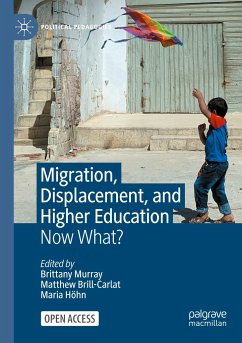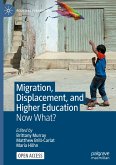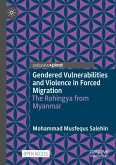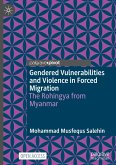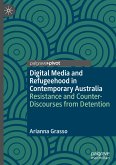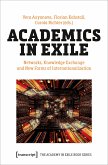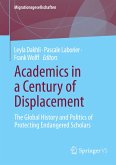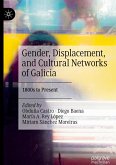Migration, Displacement, and Higher Education
Now What?
Herausgegeben:Murray, Brittany; Brill-Carlat, Matthew; Höhn, Maria
Migration, Displacement, and Higher Education
Now What?
Herausgegeben:Murray, Brittany; Brill-Carlat, Matthew; Höhn, Maria
- Broschiertes Buch
- Merkliste
- Auf die Merkliste
- Bewerten Bewerten
- Teilen
- Produkt teilen
- Produkterinnerung
- Produkterinnerung
This open access book is a nuanced introduction to Forced Migration Studies and a toolkit for faculty and undergraduate students, with a special emphasis on community-engaged learning. Experts from the social sciences, humanities, arts, and experimental sciences offer interdisciplinary perspectives to translate critical analysis into concrete action. The collection highlights activists, artists, and educators who have initiated projects in cooperation with and for the benefit of populations affected by migration and displacement. Together, these contributions powerfully articulate the…mehr
Andere Kunden interessierten sich auch für
![Migration, Displacement, and Higher Education Migration, Displacement, and Higher Education]() Migration, Displacement, and Higher Education41,99 €
Migration, Displacement, and Higher Education41,99 €![Gendered Vulnerabilities and Violence in Forced Migration Gendered Vulnerabilities and Violence in Forced Migration]() Mohammad Musfequs SalehinGendered Vulnerabilities and Violence in Forced Migration33,99 €
Mohammad Musfequs SalehinGendered Vulnerabilities and Violence in Forced Migration33,99 €![Gendered Vulnerabilities and Violence in Forced Migration Gendered Vulnerabilities and Violence in Forced Migration]() Mohammad Musfequs SalehinGendered Vulnerabilities and Violence in Forced Migration41,99 €
Mohammad Musfequs SalehinGendered Vulnerabilities and Violence in Forced Migration41,99 €![Digital Media and Refugeehood in Contemporary Australia Digital Media and Refugeehood in Contemporary Australia]() Arianna GrassoDigital Media and Refugeehood in Contemporary Australia37,99 €
Arianna GrassoDigital Media and Refugeehood in Contemporary Australia37,99 €![Academics in Exile Academics in Exile]() Academics in Exile35,00 €
Academics in Exile35,00 €![Academics in a Century of Displacement Academics in a Century of Displacement]() Academics in a Century of Displacement81,99 €
Academics in a Century of Displacement81,99 €![Gender, Displacement, and Cultural Networks of Galicia Gender, Displacement, and Cultural Networks of Galicia]() Gender, Displacement, and Cultural Networks of Galicia128,39 €
Gender, Displacement, and Cultural Networks of Galicia128,39 €-
-
-
This open access book is a nuanced introduction to Forced Migration Studies and a toolkit for faculty and undergraduate students, with a special emphasis on community-engaged learning. Experts from the social sciences, humanities, arts, and experimental sciences offer interdisciplinary perspectives to translate critical analysis into concrete action. The collection highlights activists, artists, and educators who have initiated projects in cooperation with and for the benefit of populations affected by migration and displacement. Together, these contributions powerfully articulate the relevance of the liberal arts and social sciences in preparing students to meet increasingly interconnected global challenges such as forced migration, climate change, and Covid-19.
Produktdetails
- Produktdetails
- Political Pedagogies
- Verlag: Palgrave Macmillan / Springer International Publishing / Springer, Berlin / Vassar College
- Artikelnr. des Verlages: 978-3-031-12352-8
- 1st ed. 2023
- Seitenzahl: 328
- Erscheinungstermin: 10. Februar 2023
- Englisch
- Abmessung: 210mm x 148mm x 18mm
- Gewicht: 426g
- ISBN-13: 9783031123528
- ISBN-10: 3031123522
- Artikelnr.: 64235490
- Herstellerkennzeichnung Die Herstellerinformationen sind derzeit nicht verfügbar.
- Political Pedagogies
- Verlag: Palgrave Macmillan / Springer International Publishing / Springer, Berlin / Vassar College
- Artikelnr. des Verlages: 978-3-031-12352-8
- 1st ed. 2023
- Seitenzahl: 328
- Erscheinungstermin: 10. Februar 2023
- Englisch
- Abmessung: 210mm x 148mm x 18mm
- Gewicht: 426g
- ISBN-13: 9783031123528
- ISBN-10: 3031123522
- Artikelnr.: 64235490
- Herstellerkennzeichnung Die Herstellerinformationen sind derzeit nicht verfügbar.
Brittany Murray is Assistant Professor of French at the University of Tennessee, Knoxville, USA, and a former member of the Consortium on Forced Migration, Displacement, and Education's leadership team at Vassar College. Matthew Brill-Carlat is an immigration paralegal serving unaccompanied children in New York, USA. He is former Coordinator of Research and Pedagogy and member of the leadership team of the Consortium on Forced Migration, Displacement, and Education at Vassar College. Maria Höhn is Professor Emerita of History on the Marion Musser Lloyd '32 Chair at Vassar College, New York, USA, where she was Director and Principal Investigator of the Andrew W. Mellon Foundation-funded Consortium on Forced Migration, Displacement, and Education.
1. If Not Now, When?.- 2. A Developing Community of Collaboration in Indiana.- 3. Learning Together: Exploring Visual and Textual Narration with Students Affected by Forced Migration.- 4. Global Cultural Exchange, Women's Leadership, and Advocacy: Connecting the Hudson Valley and the Gaza Strip through WhatsApp.- 5. Refugees and Forced Migration: An Engaged Humanities Course in French and Francophone Studies.- 6. Education Can't Wait for LGBTQ Refugees? Exploring Inclusion and Access to Higher Education in Kakuma Refugee Camp.- 7. Migration, Death, and Disappearance: Education and Engagement in Tuscon, Arizona.- 8. Teaching Undergraduate Forced Migration Studies through a Community-based Law and Policy Clinic during COVID: What are the crises and opportunities?.- 9. Court Interpretation, or Ganas Goes Legit.- 10. Searching for Safety and Researching for Justice: Documenting Migrant Experiences in the Paso del Norte Border Region.- 11. What Can Architectural Education Do? Froma Design-Oriented Approach toward a Research-Oriented Approach and Politically Informed Spatial Practice in the Refugee Context.- 12. The Archaeology of Forced Migration in Greece: A Layered Pedagogy.- 13. Teaching Forced Displacement with Geospatial Technology in Refugee Camps: Lessons from Rwanda and Jordon.- 14. On the Pedagogical Value of Not Going There: Mobility, Fossil Fuel Consumption, and the Production of Refugees.- 15. Teaching Tragedy: Toward a Pedagogy of Accountability - The Every Campus A Refuge Model.- 16. The Power of Participatory and Immersive Filmmaking.- 17. Finding Place: Strengthening Pedagogical Practices on Forced Migration through Interpersonal Understanding in Higher Education.- 18. Climate Change, Human Displacement, and STEM Education: Toward a More Transdisciplinary and Inclusive Culture of Science.- 19. Reading Eveline in Jakarta: Community Learning with Hazara Refugees.- 20. Place-Conscious Education: Teaching Displacement Using Oral Histories in Virtual Reality.- 21. Learning at the Borders: How an Experimental Learning Course in Bern, Switzerland Transformed Undergraduate Learning about Memory, Mental Health and Displacement.- 22. Rebuilding After War and Genocide: Learning with and From Refugees in the Transnational Digital Classroom.- 23. Small Things.
1. If Not Now, When?.- 2. A Developing Community of Collaboration in Indiana.- 3. Learning Together: Exploring Visual and Textual Narration with Students Affected by Forced Migration.- 4. Global Cultural Exchange, Women's Leadership, and Advocacy: Connecting the Hudson Valley and the Gaza Strip through WhatsApp.- 5. Refugees and Forced Migration: An Engaged Humanities Course in French and Francophone Studies.- 6. Education Can't Wait for LGBTQ Refugees? Exploring Inclusion and Access to Higher Education in Kakuma Refugee Camp.- 7. Migration, Death, and Disappearance: Education and Engagement in Tuscon, Arizona.- 8. Teaching Undergraduate Forced Migration Studies through a Community-based Law and Policy Clinic during COVID: What are the crises and opportunities?.- 9. Court Interpretation, or Ganas Goes Legit.- 10. Searching for Safety and Researching for Justice: Documenting Migrant Experiences in the Paso del Norte Border Region.- 11. What Can Architectural Education Do? Froma Design-Oriented Approach toward a Research-Oriented Approach and Politically Informed Spatial Practice in the Refugee Context.- 12. The Archaeology of Forced Migration in Greece: A Layered Pedagogy.- 13. Teaching Forced Displacement with Geospatial Technology in Refugee Camps: Lessons from Rwanda and Jordon.- 14. On the Pedagogical Value of Not Going There: Mobility, Fossil Fuel Consumption, and the Production of Refugees.- 15. Teaching Tragedy: Toward a Pedagogy of Accountability - The Every Campus A Refuge Model.- 16. The Power of Participatory and Immersive Filmmaking.- 17. Finding Place: Strengthening Pedagogical Practices on Forced Migration through Interpersonal Understanding in Higher Education.- 18. Climate Change, Human Displacement, and STEM Education: Toward a More Transdisciplinary and Inclusive Culture of Science.- 19. Reading Eveline in Jakarta: Community Learning with Hazara Refugees.- 20. Place-Conscious Education: Teaching Displacement Using Oral Histories in Virtual Reality.- 21. Learning at the Borders: How an Experimental Learning Course in Bern, Switzerland Transformed Undergraduate Learning about Memory, Mental Health and Displacement.- 22. Rebuilding After War and Genocide: Learning with and From Refugees in the Transnational Digital Classroom.- 23. Small Things.

